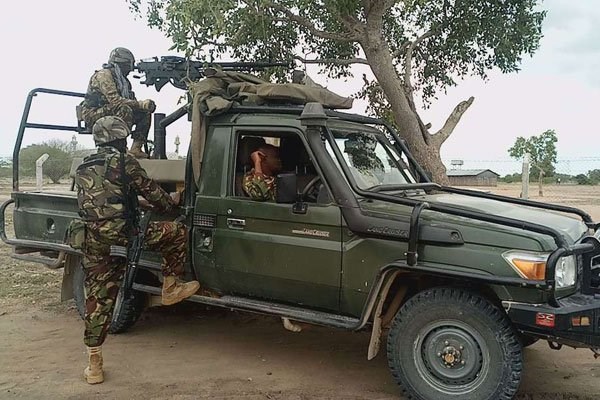
Sunday April 26, 2020
By AGGREY MUTAMBO

A file photo of KDF soldiers during a patrol in Kotile town on the Garissa-Lamu-Somalia border, as part of the Linda Boni operation aimed at flushing out Al-Shabaab terrorists. PHOTO | KALUME KAZUNGU | NATION MEDIA GROUP
Regional security agencies must beware of a potential new wave of violent extremism in the season of Covid-19.
Experts poring over the problem of radicalisation and violent extremism say the terror merchants may take advantage of the shift in attention by authorities towards the novel coronavirus to strike where it hurts.
In a Webinar on Friday, panellists said it may be too early to determine how the flow of Covid-19 will affect counter-terrorism measures, but they did admit the terror groups may use the chaos to advance their agenda.
Dr Mustafa Ali, Secretary-General of the Global Network of Religions for Children, an interfaith movement for security rights of children, told the audience that security agencies must watch how terrorist groups behave during the pandemic.
“We don’t know yet how these groups would want to use this disease. We don’t know if they could take a suicidal route. The extremists know that mosques are closed and therefore they have moved online.”
The online seminar was organised as countries in the region battled the coronavirus.
Countries that are members of the regional bloc, Intergovernmental Authority on Development (Igad), had reported more than 2,000 infections and at least 50 deaths by Friday morning.
They include Uganda, Kenya, Somalia, Ethiopia, South Sudan, Sudan and Djibouti.
These countries have traditionally battled extremist group Al-Shabaab, based in Somalia, but allied to Al-Qaeda, with some splinter groups pledging allegiance to Islamic State in Syria (Isis).
The group has killed at least 500 people in Somalia every year in the last four years.
In neighbouring Kenya, the group has also been launching monthly devastating attacks.
MIXED REACTIONS
When Covid-19 started ravaging Europe and the US, some celebrated, as Western powers are routinely their enemies.
Isis instructed its members to avoid Europe, citing Koran teachings warning faithful against entering places with plague.
Al-Qaeda in its statement in March argued the virus may have been God’s punishment on those who oppress Muslims, even as it reminded member on the hygienic teachings in Islam.
In Somalia, Al-Shabaab leaders claimed the virus had been imported by foreign forces the group had been fighting, using it to call for their removal.
But, actually, the first case imported in Somalia was by a Somali citizen returning from China.
Subsequent cases have been determined among UN staffers as well as local transmissions. None of the cases is among the African Union Mission forces the group has been battling.
ONLINE OPERATIONS
Dr Ali, also the Chairman of the Horn Institute in Nairobi, said Al-Shabaab members may warn each other against the dangers of Covid-19, but are likely to operate parallel to the government's directives on hygiene.
“They don’t care about government orders for people to be locked down. And so, with effect, they are helping wittingly or unwittingly to spread Covid-19,” he said during the Webinar on ‘Covid-19 Lockdown: A Breeding Ground for Online Radicalisation to Violent Extremism.’
Other panellists said it was up to authorities to package a counter narrative such as showing the virus is equally ravaging Muslim-majority countries.
Sami Gathii, the Director for Youths, Arts and Entrepreneurship Network, said that will help dissuade the youth from subscribing to extremism content, now that most people are searching for information online.
“Violent extremism disrupts people’s lives. Covid-19 has disrupted people’s lives. There is a parallel in the way both spread fear among the people. The reality is that people are anxious about the future and so, every response has to take this into account,” he argued.
“It is important to pay attention to the most vulnerable group - children and youth - who are at risk of being radicalised during the pandemic.”